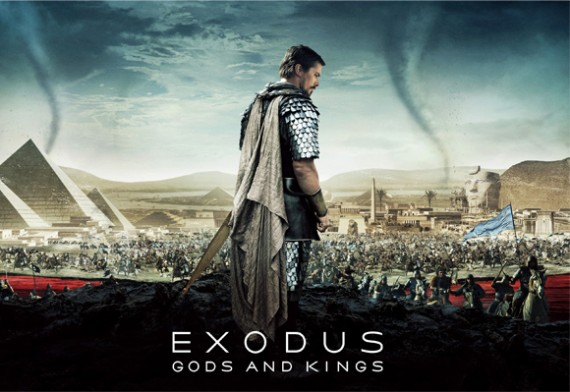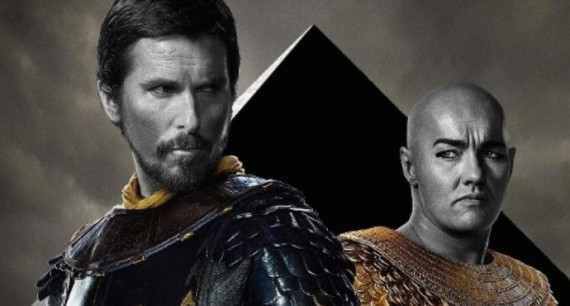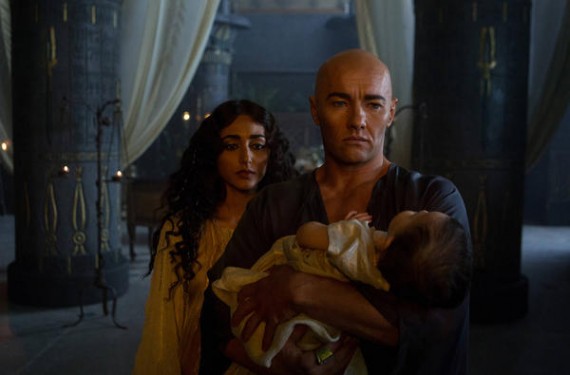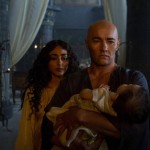I finally watched “Exodus: Gods and Kings” last night. I watched it with my wife, Wendy.
Well, we watched part of it … we got too tired and went to bed after 90 minutes.

I wasn’t too happy with many of the changes in the movie from the biblical account, but whatever. It’s Hollywood. Frankly, I’m a little more upset at the travesty of the 3-part “The Hobbit” than I am at what Hollywood did to the Exodus story. But that’s not the point here either.
What I found most fascinating was how Yahweh, the God of Israel, was portrayed in the movie. And I’m not talking about how he was a little boy. I don’t care about that.
What I found most interesting about the movie is that God was portrayed as this violent, blood-thirty, thoughtless, bumbling, vengeful deity. There was a clear power struggle in the movie between God and Pharaoh (who thought he was a god). That probably explains the subtitle for this movie: “Gods and Kings.”
And frankly, though there were many ways that the movie strayed from the biblical account of the Exodus, the way that the book of Exodus portrays God is not one of the ways the movie strayed. If we really read the book of Exodus without our Christian rose-colored glasses, the God of the book of Exodus is quite similar to the God portrayed in the movie “Exodus.” Several things about the book of Exodus which have always bothered me about how God is portrayed in that book were brought into clear focus in the movie.
What I found most interesting was how the movie stayed true to the biblical text … specifically in regard to the violence of God in the book of Exodus.
I know nothing about the director, Ridley Scott, but he is either a fundamentalist Christian who believes the book of Exodus accurately portrays God as He really is, or he’s an atheist who wants to point out how bloodthirsty the God of the Exodus is.
Isn’t it interesting that both atheists and fundamentalist Christians have a similar view about the God of the Exodus?

Anyway, here is a short list of how God is portrayed in this movie:
1. 400 Years of … Absence
When Moses first encounters God on the mountain, he wants to know why God has waited 400 years to do anything about the slavery of his people. Good question! He gets no answer. But this theme comes up later …
2. Leave Your Wife and Child
When Moses heads off to Egypt, Moses’ wife gets it right when she says, “What kind of a God asks a man to leave his wife and children?” I actually laughed at this part of the movie, because not three seconds earlier my wife asked the exact same question. Same exact words. Same tone. Everything.
Moses’ basic answer was, “I don’t ask questions. I just follow orders.” Of course, later God denies that He ever told Moses to leave his wife and children. That was Moses’ decision.
Hmmm… So is God saying that Moses could have brought his wife and young son into the hell-hole that became Egypt?
3. Freedom through Warfare
Moses begins his attempt to free the Israelites by engaging in guerilla warfare. After numerous cycles of vengeance and retaliation increase the bloodshed, pain, and suffering on all sides, God shows up again and tells Moses he’s taking too long.
Moses says, “What? You wait 400 years and now you’re in a hurry?”
God doesn’t really answer him again, but simply says “Just step back and watch what I can do.”
4. Any war you can do, God can do better
Crazily enough, this is when the pain, suffering, bloodshed, and slaughter really begins in earnest. First we get a scene of crocodiles tearing people limb from limb in the Nile river. Apparently, this is how the Nile turned to blood. All the fish die. Rice fields are ruined. People starve.
Plague follows upon plague, each one more bloody, brutal, and terrifying than the last. Worst of all, these plagues hit Egyptian and Hebrew alike. Moses brings this up to God. He basically says, “You know, if you want to be loved by the Hebrew people, you probably shouldn’t inflict the same plagues on them that you inflict upon the Egyptians.”
God responds by saying, “Oh! Good point!” and starts sending plagues just upon the Egyptians.
The scene where the poor, starving Egyptian farmer wails in misery over his last dead cow is especially touching.
5. God will have His bloody revenge!
At one point, Moses tells God that enough is enough. He grew up with these Egyptian people. He was one of them. It is difficult, he says, to see people you love suffer so greatly. Basically, Moses points out that these plagues from God don’t seem to be doing anything more than the guerilla warfare was doing, and God was behaving a little too violently.
God gets angry at Moses at this point, and tells him, “Don’t talk to me about violence! I have watched my people suffer under slavery for 400 years, and now you think that I am being too violent?! I will have my revenge!” …
So God waited through 400 years of violent oppression and slavery so that He could exact violent revenge upon the Egyptians?
6. When it comes to a killing contest … God wins!
By now, Pharaoh is pretty upset. So late one night, in a fit of (justifiable?) anger, he declares that Moses and Moses’ God have gone too far, and if this is a contest about who can kill the most people, he will kill all of the young Hebrew children. He will prove that Pharaoh is better at killing that Moses or the God of Moses.
God hears this, and basically says, “Oh yeah? Watch this.” And then he kills all the firstborn sons of Egypt. In other words, “You think you’re good at killing? You know nothing. When it comes to a killing contest, I always win. Watch this …”
Then all the firstborn sons of Egypt die, including Pharaoh’s own son.
As a result, Pharaoh finally tells Moses that he and the Israelites can leave Egypt, but in so doing, he asks the most poignant question of the movie. He says to Moses, “What kind of God kills little children? How can you worship such a God?”
We, as the movie viewers are supposed to see the irony. Pharaoh seems to have forgotten that he, as an Egyptian deity, was planning to kill children, and therefore, his question proves that he is not a god or, if he is, he is not worthy of worship.
But doesn’t the same logic apply to the God of Israel? It seems so.

Closing Questions about the Exodus
That’s where I stopped watching the movie. I will finish it tonight.
Look. I believe the Bible too. And yes, in case you are wondering, I believe in the inspiration and inerrancy of the Bible. Yes, every word.
So how can I write what I did above? Because I believe that the truth which the inspired and inerrant biblical text teaches us is not the truth that many Christians say it is.
I plan on writing a lot more about this in the months ahead, so stay tuned.
Until then, if you are troubled by what I have written above, or if you were troubled by the way God was portrayed in this movie, but you are not troubled by the way God is actually portrayed in the book of Exodus, you might want to ask yourself “Why?” How is it that you would get upset if Pharaoh killed children, but not upset when God does it?
Why are some Christians upset that the cast of Exodus was mostly “white” people, but not too upset about the violence of God in the movie?
Why are some Christians upset that God was portrayed as a child, but not upset that God was horribly violent?
Why are some Christians upset at the “naturalistic” explanation for the plagues, but not upset at how God was the primary source of this violence?
Why are Christians upset about everything in the Exodus movie, except for how God was involved with violence?
Well… maybe some people were upset about these things, and I just didn’t hear about it.
How about you? Did you watch the movie “Exodus”? What were your thoughts? Share below!




God created the Laws of Physics, but is not subject TO them. WE ARE. He is NOT. Similarly, God created the Laws of MORALITY, but is not subject to them. WE ARE. He is not. That said, since God authored LIFE ( Creation) , he is free to take it BACK again ( termination, although WE are the ones who brought death into th World to begin with. we were WARNED, but did not LISTEN. He can REMAKE the Life that was Created ( Birth ), Taken ( Crucifixion) and remake it AGAIN ( Resurrection). Thus what man sees as finality ( death), God sees as something He can, will, and does change at WILL. We are subject to HIM. Who exactly is HE subject to again? And what does MAN plan on doing about it? Even his best ANGEL cannot beat Him. Let’s just do it HIS way, and cut through the red tape. . .
Jeremy is subject to the Law of God. GOD is not subject to the opinion of Jeremy, Simon, or anyone else. He was BEFORE everyone and anyone else, and He will be long after, whether we are , or not.
Simon, are you saying that God can steal life and health from people simply because He is God? That God can kill anybody He wants for no reason other than that He is God? That God can destroy His creation simply because He created it?
I saw the movie and liked it. From all the approaches to dealing with the violent passages of scripture I have benefited from Derek Flood’s the most. Greg Boyd just recently critiqued his book in four posts. Derek responded in three, and won the argument I would say.
I know that your approach seems to be very similar to Boyd’s. So I thought you may be interested in Derek’s critique of Boyd’s work. Who knows? Reading it may just give you new ideas;)
Juan,
Yes, I have read both sets of posts by both authors. I have also read Derek’s book. I was a little shocked to see that Derek Flood accused Greg Boyd of teaching penal substitution. Ha! Greg will not like that!
As you know, I’ve been struggling with this same issue for quite a while now too. For a while, I thought Greg and I were arguing the same thing. Now I am not so sure. I will have to wait for his book. Is it really up to 1200 pages now? Yikes.
I think I have a way to meld both the views of Flood and Boyd, a way that takes the strengths of both arguments and avoids the weaknesses. Also, it’s pretty simple. The primary problem with my former attempt to explain the violence of God was that it was incredibly complex.
If it’s too complex it won’t be of much help to most people. I’m always fascinated by how Jesus managed to teach deep truths in accessible ways.
Not seen it yet, is it worth a look?
No, probably not. 😉 I actually prefer the old “The Ten Commandments”
he is sovreign and answers to nobody
Well, He answers to Himself at least.
I think God is not the cruel Being that people think of in th OT. God wanted human companionship and he got people who questioned His authority. He had every right to kill us all, and even lamented over our existence. was Adam still thinking about God? God was surely in his life and the lives of other humans. Abraham was righteous before God called him, and that’s why he was rewarded. Until God shows up in Exodus, you don’t see the people Israel worshipping God at all. Then the continuously tell God in a manner of speaking He is not important. They stray and are not punished immediately. How else will they acknowledge God? We are the same as humans. We have the institution of church but do we put priority on knowing and walking with Him? No we don’t.
So because we do not give God the attention and worship He wants from us, He has the right to kill us?
In other words, God is in Heaven saying, “Worship me or die!”
Even if God received worship for such a threat, would it really be worship?
If you went to your spouse with a gun in hand and said, “Love me or die!” would any love you received be actual love?
I never said that! Someone on another thread said this: God told Moses (paraphrased) “bring the people to My holy mountain so they can speak with me and have a RELATIONSHIP”, the people were afraid, so they told Moses to go up the mountain and he brought back a list of RULES. We do the same thing, we should seek a RELATIONSHIP, but we always tend toward a model of RULES, like the institutional church. Relationships are uncomfortable for people, isn’t that why there is so much anger and strife in the world? We can’t get along with each other in the simplest relationships.
God does not defy His own laws. He enforces them. God is loving, patient, compassionate, etc… but He is also just. He does use violence but not capriciously. I did not watch the movie and will not. The preiews made it clear that it would no be scriptural. Yes, I know it is only meant for entertainment, but I cannot approve of entertainment created at the cost of scripture. Many people who have not read the scriptural account will come away from this film with a very false view of what the scripture teaches. I believe this movie and others like it (including the tv show ‘The Bible’) are our adversary’s latest plan to water down, discredit, and misrepresent God’s word. It is our task as His disciples to correct these accounts, not endorse them.
No that’s not what I meant. He doesn’t say today “worship Me or die”. He never said that. But we humans would not acknowledge God if He didn’t present Himself. In fact He dies for us and we don’t acknowledge it. The Israelites were supposed to represent God in the world but they strayed unles He made them rich and powerful. Gods presence in that way didn’t help the world to know God. Haven’t you heard atheists say “I won’t believe unless I see you”. Even a miracle or a showing of Himself won’t change somebody. Life isn’t different for believers and nonbelievers except the way we look at things.
A recommended viewing. THE EXODUS (The biblical Conspiracy Documentary) Timeline. It, s on YouTube. Do not be mislead by the title. It is not about some wacky Conspiracy. It show the hand of God in nature. A fasvinsting and faith building documentary.
And this documentary uses scripture running alongside its content. Seriously folks!!! Watch this documentary!!!!!!